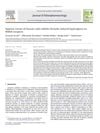 January 2017 in “Elsevier eBooks”
January 2017 in “Elsevier eBooks” Stress and hormones like progesterone can affect absence seizures, but their effects change with different life stages.
 September 2021 in “Journal of skin and stem cell”
September 2021 in “Journal of skin and stem cell” Lactium, a milk protein, can help reduce symptoms of skin disorders linked to stress and anxiety without side effects.
18 citations,
September 2021 in “Journal of Neuroendocrinology” Neurosteroids can influence behavior by modulating brain inhibition, with potential for treating psychiatric disorders.
 31 citations,
November 2014 in “Investigative Ophthalmology & Visual Science”
31 citations,
November 2014 in “Investigative Ophthalmology & Visual Science” A natural steroid in the body may protect against eye damage in glaucoma.
14 citations,
September 2017 in “Hormones and behavior” δ-GABAA receptors affect alcohol consumption based on the estrous cycle and influence movement regardless of the cycle.
 9 citations,
January 2009 in “PubMed”
9 citations,
January 2009 in “PubMed” Finasteride treatment can decrease certain steroids and increase others, possibly leading to depression symptoms in some cases.
 34 citations,
November 2011 in “Alcoholism: Clinical and Experimental Research”
34 citations,
November 2011 in “Alcoholism: Clinical and Experimental Research” Three drugs change mice's alcohol drinking patterns by affecting GABAA receptors.
 40 citations,
December 2019 in “Neurobiology of Stress”
40 citations,
December 2019 in “Neurobiology of Stress” Neuroactive steroids show promise for treating mental and neurological disorders by targeting GABA_A receptors.
 August 2008 in “European Neuropsychopharmacology”
August 2008 in “European Neuropsychopharmacology” RY-023, a specific drug, can improve early stage memory learning without affecting general activity in rats, but it's less effective for later learning stages and doesn't impact memory recall.
 10 citations,
September 2014 in “The Journal of Steroid Biochemistry and Molecular Biology”
10 citations,
September 2014 in “The Journal of Steroid Biochemistry and Molecular Biology” Allopregnanolone increases KCC2 expression in baby male rats' brains, while finasteride doesn't affect it.
 29 citations,
July 2004 in “Pharmacology, Biochemistry and Behavior”
29 citations,
July 2004 in “Pharmacology, Biochemistry and Behavior” Finasteride reduces alcohol withdrawal effects, especially in female mice.
 2 citations,
July 2020 in “Behavioural Brain Research”
2 citations,
July 2020 in “Behavioural Brain Research” Changing neuroactive steroids in baby male rats affects their memory and learning differently as they grow up.
2 citations,
June 2018 in “Physiology & behavior” Early changes in brain chemicals affect how a drug reduces alcohol intake in rats.
 17 citations,
February 2009 in “Journal of Ethnopharmacology”
17 citations,
February 2009 in “Journal of Ethnopharmacology” Asiasari radix extract may relieve certain types of pain by affecting GABA and NMDA receptors.
11 citations,
April 2018 in “Epilepsy research” Letrozole reduces seizures but not brain damage in mice.
 27 citations,
July 2008 in “Neuroscience”
27 citations,
July 2008 in “Neuroscience” Finasteride given to baby rats causes anxiety-like behavior and worsens learning from punishment in adult rats.
 34 citations,
April 2014 in “Psychopharmacology”
34 citations,
April 2014 in “Psychopharmacology” Stress and alcohol affect brain chemicals differently in rats, mice, and humans, influenced by genetic differences.
 November 2019 in “Synapse”
November 2019 in “Synapse” Brain-made chemicals can control nerve cell function differently in various parts of a mouse's brain, which may help us understand neurological conditions.
 3 citations,
October 2015 in “Human Psychopharmacology-clinical and Experimental”
3 citations,
October 2015 in “Human Psychopharmacology-clinical and Experimental” Finasteride doesn't affect sleep spindles in men.
 34 citations,
May 2007 in “Neuroscience”
34 citations,
May 2007 in “Neuroscience” Finasteride reduces alcohol withdrawal severity in male mice but increases it in female mice.
 2 citations,
December 2019 in “Neurobiology of Stress”
2 citations,
December 2019 in “Neurobiology of Stress” Changing allopregnanolone levels in baby rats affects their adult behavior and alcohol use.
 26 citations,
July 1995 in “Neurobiology of Aging”
26 citations,
July 1995 in “Neurobiology of Aging” Finasteride affects prostate weights and pituitary activity differently with age.
7 citations,
May 2017 in “Behavioural brain research” Changing neuroactive steroid levels early in life can affect how adult rats respond to alcohol's stimulating effects.
 17 citations,
February 2014 in “The International Journal of Neuropsychopharmacology”
17 citations,
February 2014 in “The International Journal of Neuropsychopharmacology”  134 citations,
June 2005 in “Neuropsychopharmacology”
134 citations,
June 2005 in “Neuropsychopharmacology” GABRA2 gene variations impact alcohol response, and hair loss medication finasteride reduces some effects.
August 2022 in “Metabolic Brain Disease” Ferulic acid may help control menstrual cycle-related epilepsy by affecting female hormones.

Early NAS level changes affect alcohol consumption vulnerability.
25 citations,
June 2017 in “Neuropharmacology” Increasing TSPO in the brain reduces anxiety and depression.
March 2023 in “Epilepsia” Trilostane may help delay epilepsy development by increasing certain brain chemicals.
 54 citations,
August 2005 in “Alcohol”
54 citations,
August 2005 in “Alcohol” Finasteride affects alcohol intake in male mice, possibly due to neurosteroids.






















